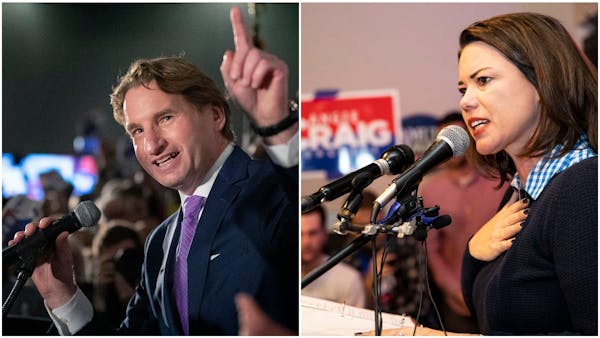The new Democratic majority in the Minnesota House selected Rep. Melissa Hortman as speaker Thursday night, signaling a dramatic reshuffling of legislative priorities after four years of GOP control.
Meanwhile, Senate Republicans unanimously re-elected Sen. Paul Gazelka as majority leader.
Hortman led Democrats to a major victory Tuesday, flipping 18 seats in Democrats' favor — far more than the 11 they needed to gain the majority. The employment attorney from Brooklyn Park becomes the lead negotiator for House Democrats as they work with Republicans in the Senate and Democratic Gov.-elect Tim Walz on a range of issues, including setting a budget for the next two years.
"We have some very significant unfinished business from the last session. And so we will get started right away looking at tax conformity, addressing the opioid epidemic, nursing home abuse and neglect and other issues that were wrapped up in that 990-page bill," Hortman said of the omnibus bill that Democrat Gov. Mark Dayton vetoed at the end of the last session.
DFL House lawmakers also selected Ryan Winkler, of Golden Valley, as the next majority leader and Liz Olson, of Duluth, as majority whip.
When those lawmakers convene for the start of the next session Jan. 8, Minnesota will be the only state in the nation with a divided Legislature.
"Minnesotans like divided government, and here we are again with divided government," said Gazelka, an insurance agent from Nisswa. "They want it to work, and I think they like some of the ideas on both sides of the aisle."
Senate Republicans could provide a check on some of the policies that Walz and House Democrats have proposed, such as increasing the gas tax and expanding the state's MinnesotaCare health insurance program, Gazelka said.
He said they need to work on lowering the cost of health care, as well as passing a balanced budget and altering the state's tax code so it aligns with federal changes.
Regarding gun laws, he did not note any particular policies but said legislators were exploring some ideas last year and could look for areas where they agree with Democrats.
With a very narrow majority, Senate Republicans will be seeking common ground and ways to partner with Senate Democrats.
Republicans also selected Sen. Jeremy Miller as the next Senate president on Thursday. Miller has been a member of the Senate's bipartisan coalition called the Purple Caucus, and he said he will continue to work with Democrats and believes his bipartisan relationships factored into his election by fellow senators.
Miller is a small-business owner from Winona and has served in the Senate since 2010. He is chairman of the Jobs and Economic Growth Finance and Policy Committee. As the next president, he will preside over Senate discussions. He is taking over the leadership position previously held by Lt. Gov. Michelle Fischbach, who resigned from the Senate in May after 22 years.
Residents of Fischbach's St. Cloud-area district chose Republican state Rep. Jeff Howe to fill her seat in a special election Tuesday that decided which party controlled the Senate.
The GOP will hold the Senate by one seat, with 34 Republicans and 33 Democrats.
On Thursday, Senate Republicans also announced their four assistant majority leaders for the session, including two new picks: Sen. Karin Housley of St. Marys Point and Sen. John Jasinski of Faribault. Housley lost a U.S. Senate bid against Democrat U.S. Sen. Tina Smith on Tuesday.
Sen. Michelle Benson, of Ham Lake, and Sen. Gary Dahms, of Redwood Falls, have served as assistant majority leaders for the past two years and will continue to do so.
Democrats in the Senate, led by Senate Minority Leader Tom Bakk, D-Cook, did not see any changes in their membership this election season and will keep the leadership currently in place, spokeswoman Ellen Anderson said.

Minneapolis schools, teachers reach tentative agreement to avert strike
Men knock woman down and steal her dog during walk, St. Paul police say

Minneapolis reaches $150k settlement with eyewitness of George Floyd's murder
He grew up legally in Minnesota, but immigration law gap may one day force student to leave

